- Home
- Clarice Lispector
Agua Viva Page 7
Agua Viva Read online
Page 7
But if I hope to understand in order to accept things— the act of surrender will never happen. I must take the plunge all at once, a plunge that includes comprehension and especially incomprehension. And who am I to dare to think? What I have to do is surrender. How is it done? I know however that only by walking do you know how to walk and—miracle—find yourself walking.
I, who manufacture the future like a diligent spider. And the best of me is when I know nothing and manufacture whatever.
Because I suddenly see that I know nothing. Is the blade of my knife getting blunt? I think it’s more likely that I don’t understand because what I’m seeing now is difficult: I’m stealthily entering into contact with a reality that is new to me and still doesn’t have corresponding thoughts, and much less any word that signifies it. It’s more of a feeling beyond thought.
How can I explain it to you? I’ll try. It’s that I’m perceiving a crooked reality. Seen through an oblique cut. Only now have I sensed the oblique of life. I used to only see through straight and parallel cuts. I didn’t notice the sly crooked line. Now I sense that life is other. That living is not only unwinding rough feelings—it’s something more bewitching and gracile, without losing its fine animal vigor for that. Upon this unusually crooked life I have placed my heavy paw, causing existence to wither in its most oblique and fortuitous and yet at the same time subtly fatal aspects. I understood the inevitability of happenstance and that is no contradiction.
The oblique life is very intimate. I shall say no more about this intimacy so as not to harm thinking-feeling with dry words. To leave the obliqueness in its own uninhibited independence.
And I also know a way of life that is gentle pride, grace in movements, slight and continuous frustration, with a skill in avoidance that comes from a long and ancient history. As a sign of revolt only a weightless and eccentric irony. There’s a side to life that is like drinking coffee on a terrace in the coldness of winter and wrapped in wool.
I also know a way of life that is slight shadow unfurled in the wind and swaying slightly over the ground: life that is floating shadow, levitation and dreams in the open day: I live the richness of the earth.
Yes. Life is very oriental. Only a few people chosen by the inevitability of chance have tasted the aloof and delicate freedom of life. It’s like knowing how to arrange flowers in a vase: almost useless knowledge. That fleeting freedom of life must never be forgotten: it should be present like a fragrance.
To live this life is more an indirect remembering than a direct living.
It resembles a gentle convalescence from something that nonetheless could have been absolutely terrible. Convalescence from a frigid pleasure. Only for the initiates life then becomes fragilely truthful. And is in the instant-now: you eat the fruit during its ripeness. Could I no longer know what I’m talking about and is everything escaping me without my noticing? I do know—but cautiously because I’m a hair’s breadth from not knowing. I feed myself delicately with trivial daily life and drink coffee on the terrace on the threshold of this dusk that looks sickly only because it’s sweet and sensitive.
Oblique life? I am well aware that there is a slight detachment between things, they almost collide, there is a detachment among the beings that lose one other amongst words that almost don’t say anything more. But we almost understand one other in this light discord, in this almost that is the only way to stand full life, since a sudden face-to-face encounter with it would frighten us, scare off its delicate spider’s web threads. We are askance in order not to jeopardise what we foresee is infinitely other in this life of which I speak to you.
And I live to the side—a place where the central light doesn’t burn me. And I speak quietly so that ears have to pay attention and hear me.
But I also know of yet another life. I know and want it and devour it ferociously. It’s a life of magical violence. It’s mysterious and bewitching. In it snakes entwine while the stars tremble. Drops of water drip in the phosphorescent darkness of the cave. In that dark the flowers intertwine in a humid fairy garden. And I am the sorceress of that silent bacchanal. I feel defeated by my own corruptibility. And I see that I am intrinsically bad. It’s only out of pure kindness that I am good. Defeated by myself. Who lead me along the paths of the salamander, the spirit who rules the fire and lives within it. And I give myself as an offering to the dead. I weave spells on the solstice, spectre of an exorcised dragon.
But I don’t know how to capture what’s happening now except by living everything that happens to me here and now and whatever it may be. I let the free horse run fiery in its pure noble joy. I, who run nervously and only reality delimits me. And when the day reaches its end I hear the crickets and become entirely full and unintelligible. Then come the early hours bulging full of thousands of blaring little birds. And each thing that happens to me I live it here by noting it down. Because I want to feel in my probing hands the living and quivering nerve of the today.
Beyond thought I reach a state. I refuse to divide it up into words—and what I cannot and do not want to express ends up being the most secret of my secrets. I know that I’m scared of the moments in which I don’t use thought and that’s a momentary state that is difficult to reach, and which, entirely secret, no longer uses the words with which thoughts are produced. Is not using words to lose your identity? is it getting lost in the harmful essential shadows?
I lose the identity of the world inside myself and exist without guarantees. I achieve whatever is achievable but I live the unachievable and the meaning of me and the world and you isn’t obvious. It’s fantastic, and I handle myself in these moments with immense delicacy. Is God a form of being? the abstraction that materializes in the nature of all that exists? My roots are in the divine shadows. Drowsy roots. Wavering in the dark shadows.
And suddenly I feel that we shall soon part. My frightened truth is that I was always yours alone and didn’t know it. Now I know: I’m alone. I and my freedom that I don’t know how to use. Great responsibility of solitude. Whoever isn’t lost doesn’t know freedom and love it. As for me, I own up to my solitude that sometimes falls into ecstasy as before fireworks. I am alone and must live a certain intimate glory that in solitude can become pain. And the pain, silence. I keep its name secret. I need secrets in order to live.
For each one of us and at some lost moment of life—is a mission announced that we must accomplish? I however refuse any mission. I won’t accomplish anything: I just live.
It’s so odd and hard to substitute the paintbrush now for that strangely familiar but always remote thing, the word. The extreme and intimate beauty is within it. Yet it’s unreachable—and when it’s within reach that’s when it becomes illusory because once again it remains unreachable. From my painting and these jostling words of mine a silence rises that is also like the substratum of the eyes. There is a thing that escapes me the whole time. When it doesn’t escape, I gain a certitude: life is something else. It has an underlying style.
Could it be that in the instant of death I shall force life trying to live more than I can? But I am today.
I write to you in disorder, I well know. But that is how I live. I only work with the lost and found.
But writing for me is frustrating: when writing I’m dealing with the impossible. With the enigma of nature. And of the God. Whoever doesn’t know what God is, will never be able to know. In the past is when the God was learned of. It’s something already known.
Do I not have a plot to my life? for I am unexpectedly fragmentary. I am piecemeal. M
y story is living. And I have no fear of failure. Let failure annihilate me, I want the glory of falling. My crippled angel who contorts all elusive, my angel who fell from the heavens to the hell where he lives savoring evil.
This is not a story because I don’t know any stories like this but all I know how to do is go along saying and doing: it is the story of instants that flee like fugitive tracks seen from the window of a train.
We will meet this afternoon. And I won’t even talk to you about this that I’m writing and which contains what I am and which I give to you as a present though you won’t read it. You will never read what I’m writing. And when I’ve noted down my secret of being—I shall throw it away as if into the sea. I’m writing you because you can’t accept what I am. When I destroy my notes on the instants, will I return to my nothing from which I extracted an everything? I must pay the price. The price of someone who has a past that is only renewed with passion in the strange present. When I think of what I already lived through it seems to me I was shedding my bodies along the paths.
It’s almost five in the morning. And the light of the fainting dawn, cold blue steel and with the tang and tart sharp taste of the day being born from the dark. And that emerges upon on the surface of time, I livid too, I being born from the shadows, impersonal, I who am it.
I’ll tell you something: I don’t know how to paint either better or worse than I do. I paint a “this.” And I write with “this”—that is all I can do. Restless. The liters of blood that circulate in the veins. The muscles contracting and relaxing. The full-moon aura of the body. Parambolic— whatever that word means. Parambolic as I am. I can’t sum myself up because you can’t add a chair and two apples. I am a chair and two apples. And I cannot be added up.
Once again I’m full of joyful happy love. Whatever you are I quickly breathe in lapping up your halo of wonder before it vanishes in the evaporation of the air. Is my fresh desire to live me and to live you the very tessitura of life? The nature of beings and of things—is God? So maybe if I demand a lot of nature, I would stop dying? Can I violate death and clear within it an opening for life?
I cut the pain of which I write to you and give you my restless joy.
And in this instant-now I see white statues scattered in the perspective of faraway distances far off—farther and farther in the desert where I get lost with empty gaze, I myself a statue to be seen from afar, I who am always getting lost. I am savoring whatever exists. Hushed, aerial, inside my great dream. Since I understand nothing—I therefore adhere to the faltering mobile reality. I reach the real through the dream. I invent you, reality. And hear you like remote bells deafly drowned in the water pealing palpitating. Am I in the core of death? And is that why I am alive? The feeling core. And this it exhilarates me. I am alive. Like a wound, flower in the flesh, the path of sorrowful blood is opened within me. With the direct and for that very reason innocent eroticism of the Indians of the Holy Pool. I, exposed to the storms, I, open inscription on the back of a stone, within the large chronological spaces handed down by the man of prehistory. The hot wind of great millenary expanses blows and singes my surface.
Today I used red ochre, yellow ochre, black, and a little white. I sense that I am near springs, pools and waterfalls, all with abundant and fresh waters for my thirst. And I, a savage at last and at last free of the dry days of today: I trot forward and backward without frontiers. I carry out sun rituals on the slopes of high mountains. But I am also taboo for myself, untouchable because forbidden. Am I the hero that carries with him the burning torch forever in a race?
Ah Force of whatever Exists, help me, Thou whom they call the God. Why does the horrible-terrible call me? that I in my horror want? because my demon is murderous and fears no punishment: but the crime is more important than the punishment. I enliven all of me in my happy instinct for destruction.
Try to understand what I am painting and what I am writing now. I’ll explain: in painting as in writing I try to see strictly in the moment in which I see—and not to see through the memory of having seen in a past instant. The instant is this one. The instant is of an imminence that takes my breath away. The instant is in itself imminent. At the same time that I live it, I burst into its passage into another instant.
That was how I saw the church portal that I painted. You argued there was excessive symmetry. Let me explain: the symmetry was the most accomplished thing I did. I lost the fear of symmetry, then of the disorder of inspiration. You need experience or courage to revalue symmetry, when one can easily imitate the falsely asymmetric, one of the most mundane originalities. My symmetry in the church portals is concentrated, accomplished, but not dogmatic. It’s touched by the hope that two asymmetries will meet in symmetry. That as a third solution: synthesis. Perhaps that’s why the portals look stripped-down, the delicateness of something lived and then relived, and not a certain irresponsible boldness of those who do not know. No, it’s not exactly calmness that you find there. There is a tough fight for the thing that though corroded remains standing. And in the denser colors there’s the lividity of something crooked that nonetheless keeps on going. My crosses have been bent crooked by centuries of mortification. Are the portals already a herald of altars? The silence of the portals. Their verdigris takes on a hue of something between life and death, an intensity of dusk.
And in the quiet colors is steel and old bronze—and all amplified by a silence of things lost and found on the ground of a steep road. I feel a long road and dust until I reach the resting-place of the painting. Even though the portals don’t open. Or is the portal of the church already the church, and when before it you have already arrived?
I struggle not to go beyond the portal. They are walls of a Christ that is absent, but the walls are there and touchable—for the hands also look.
I create the material before I paint it, and the wood becomes as indispensable to my painting as it would be to a sculptor. And the created material is religious: it has the weight of the beams of a monastery. Compact, closed like a closed door. But onto the portal openings were flayed, scratched out by fingernails. And it’s through these openings that you see what is inside a synthesis, inside the utopian symmetry. Coagulated color, violence, martyrdom, are the beams that sustain the silence of a religious symmetry.
But now I’m interested in the mystery of the mirror. I’m looking for a way to paint it or to speak of it with the word. But what is a mirror? The word mirror does not exist, only mirrors exist, for a single one is an infinity of mirrors. Somewhere in the world there must be a mine of mirrors. Mirror is not something created but something born. You don’t need many to have the sparkling and sleepwalking mine: two are enough, and one reflects the reflection of what the other reflected, in a trembling that is transmitted in an intense and mute telegraphic message, insistent, liquidity in which you can plunge a fascinated hand and pull it out dripping with the reflections of that hard water that is the mirror. Like the seer’s crystal ball, it drags me toward the void that for the seer is his field of meditation, and in me the field of silences and silences. And I can barely speak, with so much silence unfurling into others.
Mirror? That crystallized void that has in itself enough space to go ever ceaselessly forward: for mirror is the deepest space that exists. And it is a magic thing: whoever has a broken piece can go with it to meditate in the desert. Seeing oneself is extraordinary. Like a cat whose fur bristles, I bristle when faced with myself. From the desert I would also return empty, illuminated and translucent, and with the same vibrating sil
ence of a mirror.
Its form doesn’t matter: no form manages to circumscribe and alter it. Mirror is light. A tiny piece of mirror is always the whole mirror.
Remove its frame or the lines of its edges, and it grows like spilling water.
What is a mirror? It’s the only invented material that is natural. Whoever looks at a mirror, whoever manages to see it without seeing himself, whoever understands that its depth consists of being empty, whoever walks inside its transparent space without leaving the trace of his own image upon it—that somebody has understood its mystery of thing. For that to happen one must surprise it when it’s alone, when it’s hanging in an empty room, without forgetting that the finest needle before it can transform it into the simple image of a needle, so sensitive is the mirror in its quality of lightest reflection, only image and not the body. Body of the thing.

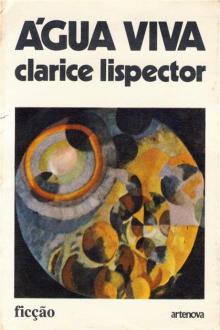 The Stream of Life
The Stream of Life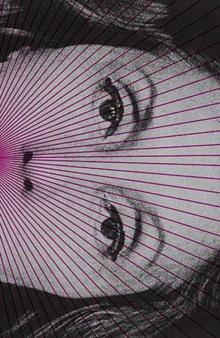 The Complete Stories
The Complete Stories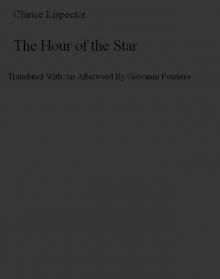 The Hour of the Star
The Hour of the Star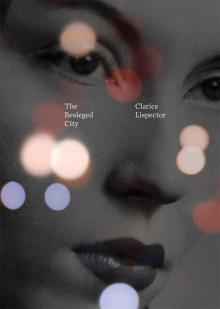 The Besieged City
The Besieged City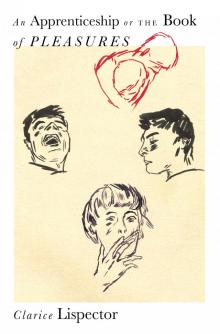 An Apprenticeship or the Book of Pleasures
An Apprenticeship or the Book of Pleasures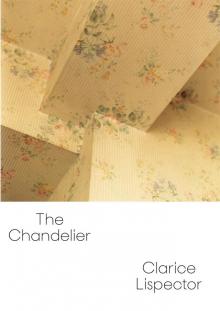 The Chandelier
The Chandelier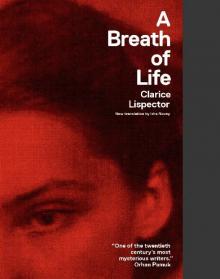 A Breath of Life
A Breath of Life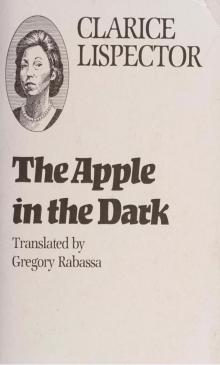 The Apple in the Dark
The Apple in the Dark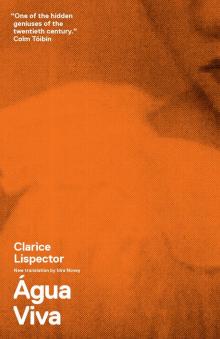 Agua Viva
Agua Viva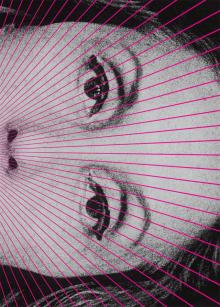 Complete Stories
Complete Stories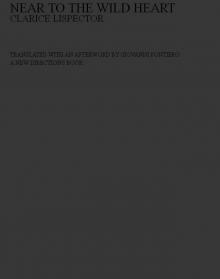 Near to the Wild Heart
Near to the Wild Heart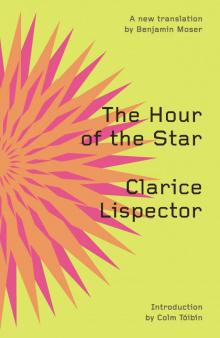 The Hour of the Star ()
The Hour of the Star ()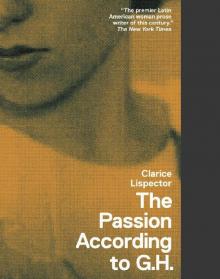 The Passion According to G.H.
The Passion According to G.H.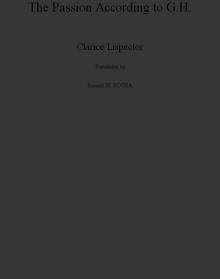 The Passion According to GH
The Passion According to GH